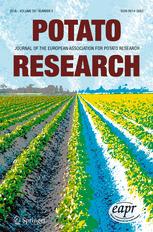Low radiation is one of the most important factors which limits potential yield in potato. Under humid conditions, the dominance of diffuse radiation not only imposes challenges for radiation use efficiency in crops but also limits the water status surveillance through non-invasive methods like infrared radiometry. This study was carried out in the humid desert of the Peruvian central coast with the aim to relate maximum stomatal conductance (gs_max, an important water status indicator) with leaf and air temperature (dT) and crop water stress index (CWSI). In a potted trial, gs_max vs. dT were compared along the day in well-irrigated (field capacity) and water restricted (half field capacity) plants. In an additional field experiment, CWSI was validated by testing two irrigation timing treatments with pre-established gs_max threshold (0.15 [T1] and 0.50 [T2] mol H2O m−2 s−1) against a control (frequently irrigated). An acute stomatal closure sensitivity was detected which drove a gs_max fall (gs↓) near the solar noon. The intense stomatal closure caused a dT rise which showed positive higher values (> 2 °C) after gs↓. The significant yield reduction of T1 in relation to the control (− 38.2 ± 10.7%) highlighted that gs_max values > 0.15 must be used to warrant a high potato yield. These findings support the use of CWSI values ≤ 0.3–0.4 as thresholds for an appropriate irrigation in potatoes with assessments taken at around 15:00 hours, time in which plants have accumulated enough radiation allowing an appropriate detection of thermal emission under humid conditions.
Infrared radiometry as a tool for early water deficit detection: insights into its use for establishing irrigation calendars for potatoes under humid conditions
Citation: Rinza, J.; Ramirez, D.; Garcia, J.; Mendiburu, F de; Yactayo, W.; Barreda, C.; Velasquez, T.; Mejía, A.; Quiroz, R. 2019. Infrared radiometry as a tool for early water deficit detection: insights into its use for establishing irrigation calendars for potatoes under humid conditions. Potato Research. ISSN 0014-3065. 62:2. pp. 109-122.
2018-10-25
CLIMATE-SMART AGRICULTURE, POTATO AGRI-FOOD SYSTEMS, POTATOES
SOUTH AMERICA
PERU
journal_article

